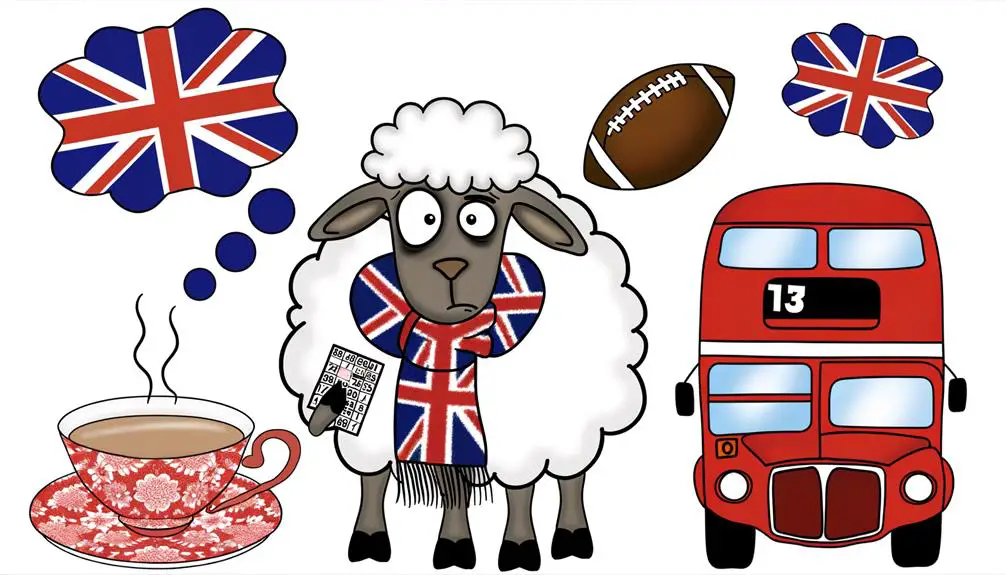In British slang, "Bingo" isn't just a game; it's your moment of triumph, that instant agreement, or a sudden revelation. It's what you exclaim when everything clicks into place, mirroring those 'Eureka moments'. Whether you've solved a problem, found something you were looking for, or struck upon an idea, saying "Bingo!" captures that feeling of success perfectly. It's a nod to a collective identity, beyond mere words, reflecting a cultural nuance that ties individuals together in understanding and celebration. Understanding its use offers a deeper insight into the fabric that weaves the social landscapes across the UK.
Key Takeaways
- 'Bingo' in British slang is often used to express a moment of success or victory.
- It signifies the moment when something sought after is found or realized.
- The term is a verbal expression of agreement or the correctness of a statement.
- It marks a 'Eureka moment,' highlighting discovery or sudden understanding.
- Reflects a cultural bonding element, signifying collective joy or achievement.
The Origins of Bingo
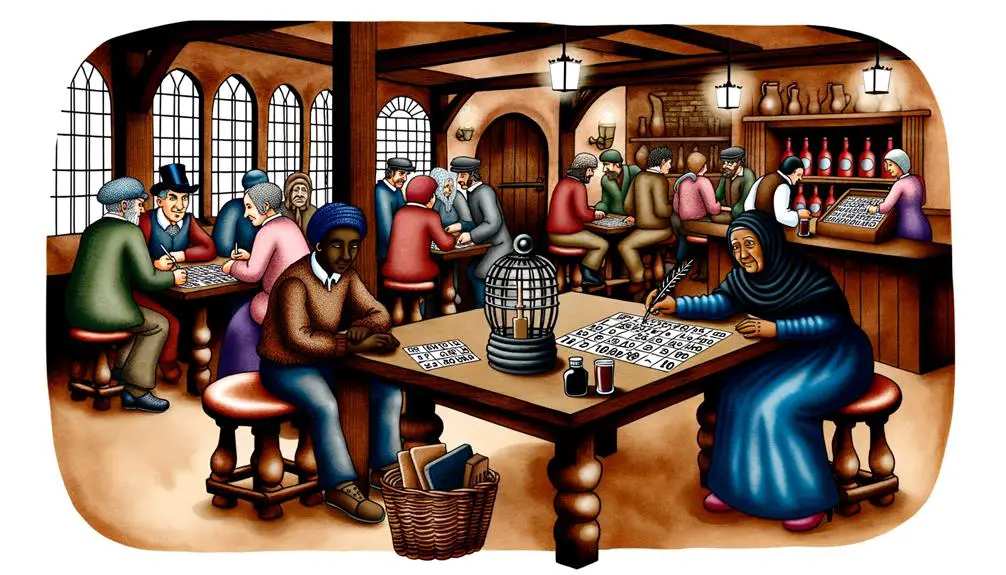
Delving into the origins of bingo, it's clear that this game has roots stretching back to the 16th century Italy, where it evolved from the Italian lottery 'Lo Giuoco del Lotto D'Italia.' What's fascinating is how you can trace the game's development through various cultures, each adding their own twist to the game mechanics, yet the core concept of lucky numbers remained integral.
As the game migrated from Italy to France in the late 1770s, it was known as 'Le Lotto,' popular among the French aristocracy. The game mechanics underwent slight modifications, but the essence of selecting lucky numbers persisted. This evolution underscores how bingo's allure lies not just in the simplicity of its rules but in the universal appeal of chance and fortune.
Bingo Beyond the Game
Beyond its straightforward mechanics and enticing allure of luck, bingo's impact extends considerably into the realm of British slang, revealing a rich tapestry of cultural significance. The game's terminology, with its unique blend of numbers and phrases, has seeped into everyday language, illustrating the depth of its integration. This isn't merely about the calls within the game; it's about how these terms have woven themselves into the fabric of communication, especially within social gatherings.
In these settings, references to bingo do not solely connote the game but serve as a bridge, connecting people through a shared understanding and appreciation of the game's linguistic quirks. It's a indication of how game terminology can transcend its original context and become part of a larger, communal lexicon. This phenomenon isn't just about language; it's a reflection of how games, especially bingo, can influence social interactions and cultural expressions.
Thus, when you're exploring the social landscapes of Britain, the echoes of bingo in conversations are more than just remnants of a game. They're signifiers of a collective identity, forged through the mingling of game terminology with the spontaneity of social gatherings.
Expressing Success
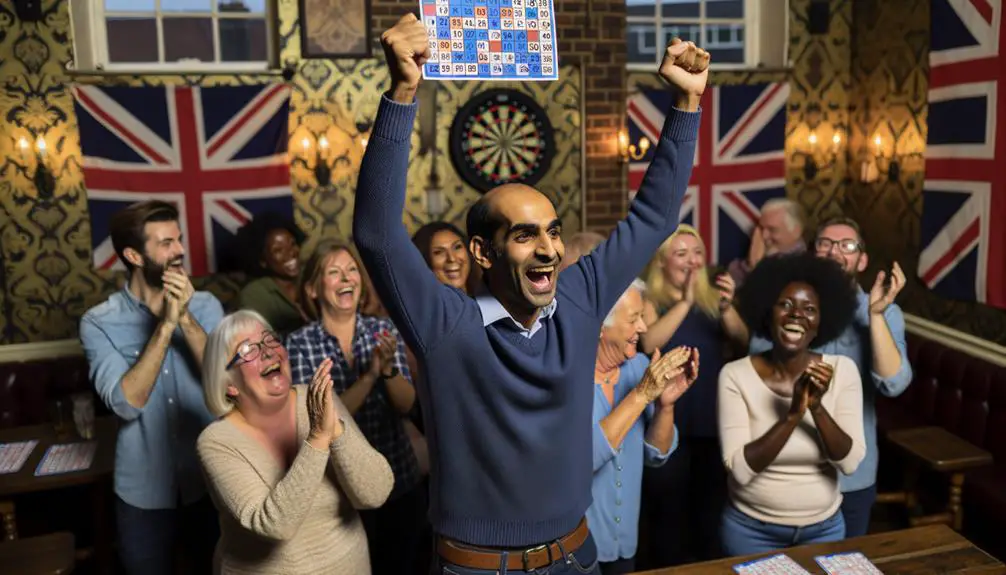
Often, when Brits exclaim 'Bingo!' in conversation, they're not discussing the game but celebrating a moment of success or realization. This phrase has shifted from the gaming halls to become a vibrant part of British slang, symbolizing a victory shout or success exclamation. When you hear someone use 'Bingo!' in this scenario, they're tapping into a deep-seated cultural tradition of acknowledging a win, no matter how small or personal it might be.
| Context | Meaning | Example |
|---|---|---|
| Work Success | Achievement of a goal | 'Fixed the bug. Bingo!' |
| Personal Realization | Sudden understanding | 'Bingo! That's why it didn't work.' |
| Social Interaction | Finding something in common | 'You love jazz too? Bingo!' |
| Problem-Solving | Finding a solution | 'If we reroute here, bingo, we save an hour.' |
This table illustrates the multifaceted use of 'Bingo!' as a success exclamation, demonstrating its versatility across different scenarios. It's more than just a word; it's an expression of triumph, a way to share joy and achievement. Understanding its use gives you insight into the British psyche, where wins, big and small, deserve their moment of recognition.
A Sign of Agreement
In British slang, "bingo" serves not just as an exclamation of success, but also as a potent verbal nod of agreement. You'll find it employed in various forms to express concurrence, ranging from casual conversations to more formal discussions. Analyzing its usage helps us understand the nuanced ways in which agreement is communicated within the context of British English.
Verbal Nod Usage
You'll find that a verbal nod, serving as a sign of agreement, is a cornerstone of effective communication in various contexts. It's more than a simple gesture; it's a nuanced part of gesture communication that complements non-verbal cues. This silent affirmation can play a pivotal role in the dynamics of a conversation, offering clarity without interrupting the flow of dialogue.
- Enhances listener engagement and shows attentiveness.
- Bridges the gap between verbal and non-verbal communication.
- Serves as a subtle yet powerful form of feedback.
- Encourages the speaker by acknowledging their points.
- Solidifies understanding and consensus without the need for verbal interruption.
Analyzing the use of verbal nods reveals the complexity and importance of seemingly simple acts of communication.
Agreement Expression Forms
Investigating the world of agreement expression forms reveals a diverse landscape where verbal nods evolve into more explicit verbal affirmations, further enriching the tapestry of human communication. You'll find that gesture communication and non-verbal cues play a pivotal role in this evolution. Beyond the domain of spoken words, a myriad of gestures serve as a sign of agreement, bridging gaps where words might fail. These non-verbal cues, from nods to thumbs-up, supplement verbal expressions, ensuring clarity and reinforcing consent. In an analytical sense, understanding these forms requires recognizing the subtle nuances that differentiate agreement from mere acknowledgment. This precision in both verbal and non-verbal communication forms a complex, yet fascinating, part of interpersonal interactions, showcasing the depth and variety inherent in expressing agreement.
Revealing a Discovery
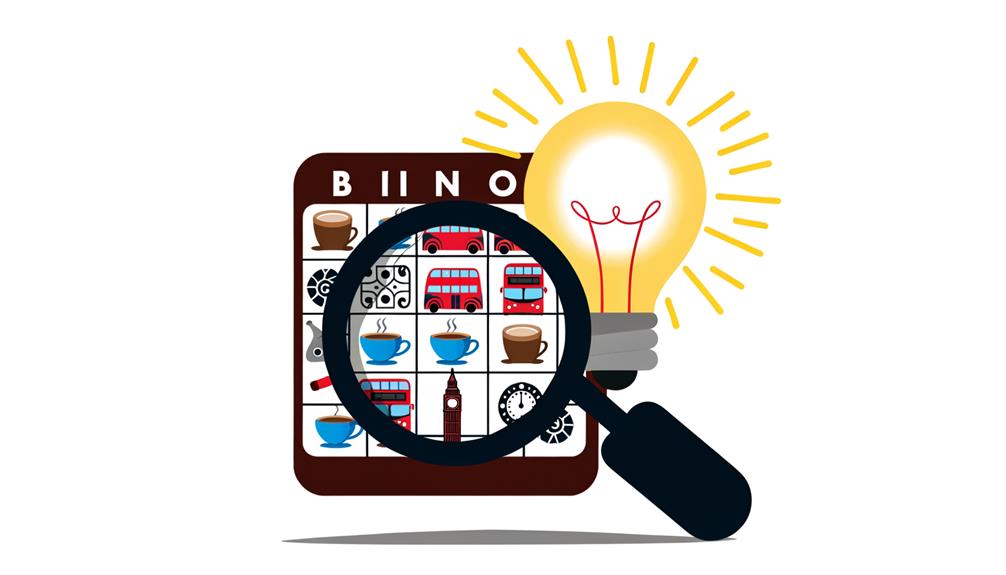
Upon uncovering the layered meanings of 'bingo' within British slang, you'll find it's more than just a game—it's a revelation of culture and context. This expression encapsulates the 'Eureka moment,' a sudden discovery joy that resonates deeply within the British ethos. Exploring 'bingo' in conversation is akin to sharing a moment of enlightenment, where the pieces of the puzzle seamlessly fall into place.
To explore deeper:
- Instant recognition: The word immediately signals the moment of finding or understanding something sought after.
- Celebration of success: It embodies the joy and satisfaction of solving a problem or locating a missing piece.
- Universal applicability: Its usage transcends age and social class, making it a versatile tool in the language.
- Cultural significance: Reflects the British penchant for understatement in expressing significant achievements.
- Linguistic efficiency: 'Bingo' packs complex emotions and the journey of discovery into a single, potent word.
In essence, 'bingo' in British slang is not just about acknowledging an achievement; it's an analytical nod to the journey of discovery, capturing the essence of the 'Eureka moment' and the profound joy it brings.
Usage in Everyday Language
In exploring the everyday language usage of "bingo" in British slang, you'll uncover not just common expressions and their meanings but also how deeply it's woven into the cultural fabric. The term's origins and its varied significance across different regions reflect the dynamic nature of language evolution. Understanding these nuances offers a clearer picture of its role in communication and identity within the UK.
Common Expressions and Meanings
You'll find that 'bingo' isn't just a game in the UK; it's woven into everyday language, carrying a myriad of expressions and meanings. This linguistic evolution has seen 'bingo' undergo colloquial adaptations, embedding itself into the fabric of British communication. Its usage offers a fascinating glimpse into how language adapts and molds itself around cultural touchstones.
- Eureka Moment: "Bingo! That's the answer I was looking for."
- Success: "Bingo! I finally got the job."
- Agreement: "You're going to the concert too? Bingo!"
- Discovery: "Bingo! I found my lost keys."
- Completion: "I've finished decorating the room. Bingo!"
These examples showcase how 'bingo' transcends its original game context, becoming a versatile expression reflecting moments of realization, success, and completion.
Cultural Impact and Origins
Delving into the cultural impact and origins of 'bingo' reveals its role as a linguistic bridge, seamlessly integrating into everyday British vernacular to express a wide array of emotions and situations. This term's historical significance is deeply rooted in the communal and gaming spheres of British society, dating back to the 1920s. Its usage reflects more than just a game; it's a marker of success, realization, or the achievement of a sought-after outcome. The slang evolution of 'bingo' underscores its adaptability and enduring relevance. As it has woven its way through decades, 'bingo' has come to encapsulate moments of triumph, agreement, or the completion of a challenge, embodying the dynamic nature of language in reflecting societal shifts and cultural identity.
Variations Across Regions
Across the UK, you'll find that the usage of 'bingo' varies greatly from region to region, reflecting the diverse linguistic landscapes and cultural nuances of each area. The term's adaptability is largely due to dialect influences and the incorporation of local idioms, which enrich its meanings and uses. Here's how regional variations add depth:
- In some areas, 'bingo' emphasizes a moment of realization, akin to an "aha" moment.
- Certain dialects use it to signify luck or serendipity, highlighting a fortuitous turn of events.
- It can serve as an expression of success or achievement, particularly in competitive contexts.
- Some regions incorporate it into playful banter, using it to underscore a point made in conversation.
- In other locales, it marks the conclusion of a search, signaling that something lost has been found.
This linguistic flexibility underscores the rich tapestry of British regional expressions, where 'bingo' adapts to fit the contours of local speech, carrying with it a flavor of the community's identity and shared experiences.
Variations Across the UK
In the UK, bingo slang exhibits notable regional variations that reflect the diverse linguistic tapestry of the country. These differences are deeply rooted in local dialects and the evolution of slang across various parts of the UK. You'll find that expressions used in one area can sometimes be completely unfamiliar in another, highlighting the rich diversity within British expressions.
Understanding these variations isn't just about recognizing different words or phrases; it's about appreciating the cultural nuances that influence language development in distinct regions. Here's a concise view of how bingo slang varies across the UK:
| Region | Slang Example | Meaning |
|---|---|---|
| London | "Duck and Dive" | 25 |
| Scotland | "Glasgow Street" | 38 |
| Wales | "Two Little Ducks" | 22 |
| Northern Ireland | "Garden Gate" | 8 |
| Yorkshire | "All the Fives" | 55 |
This table illustrates the uniqueness of bingo calls, shaped by local dialects and the ongoing evolution of slang. Each term carries its own flavor, adding a layer of cultural identity to the game that's deeply intertwined with the region's language patterns. So, when you're traversing the UK, be prepared for the bingo lingo to change as much as the landscape does.
Cultural Impact and Popularity
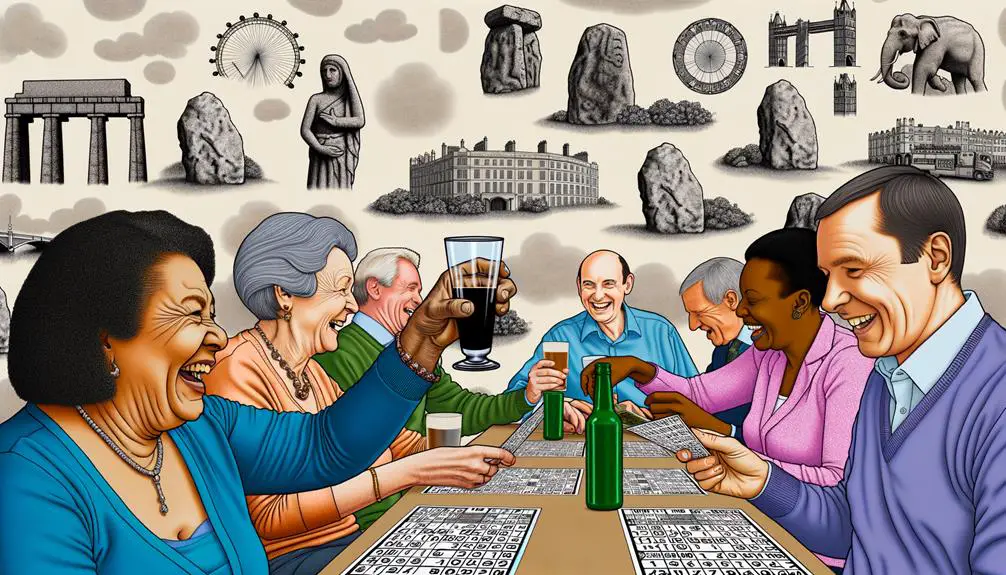
Bingo's cultural footprint, a blend of tradition and modernity, greatly shapes the social fabric of the UK, revealing its widespread appeal and deep-rooted popularity. This game's essence isn't just in the numbers; it's woven into the everyday lives through its unique bingo lingo, becoming a language of its own that bonds people across generations. At social gatherings, bingo serves not only as entertainment but as a communal ritual that brings people together, fostering a sense of belonging and community spirit.
Analyzing its cultural impact and popularity, one can't ignore how:
- Bingo lingo has permeated everyday language, with phrases like "two little ducks" and "legs eleven" recognized even outside the game's context.
- Social gatherings often feature bingo as a centerpiece, highlighting its role in British leisure and entertainment.
- Community centers and halls, where bingo is frequently played, act as key social hubs, especially for older generations.
- Online platforms have rejuvenated bingo's appeal, attracting younger audiences and broadening its demographic reach.
- Charity events and fundraisers commonly employ bingo, leveraging its popularity for social causes.
This intricate tapestry of tradition, language, and community encapsulates bingo's enduring presence and evolving role within British culture.

